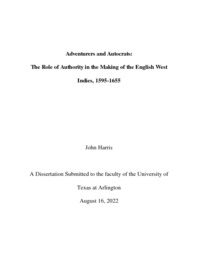
ATTENTION: The works hosted here are being migrated to a new repository that will consolidate resources, improve discoverability, and better show UTA's research impact on the global community. We will update authors as the migration progresses. Please see MavMatrix for more information.
Show simple item record
| dc.contributor.advisor | Morris, Christopher | |
| dc.creator | Harris, John Clinton | |
| dc.date.accessioned | 2022-09-15T13:05:42Z | |
| dc.date.available | 2022-09-15T13:05:42Z | |
| dc.date.created | 2022-08 | |
| dc.date.issued | 2022-08-25 | |
| dc.date.submitted | August 2022 | |
| dc.identifier.uri | http://hdl.handle.net/10106/30949 | |
| dc.description.abstract | After Walter Ralegh made his famous journey to the Orinoco in 1595, English adventurers began the haphazard process of colonizing the West Indies. Initially they tried to follow Ralegh’s efforts in Guiana, but their every effort failed because they lacked access to significant investment capital and did not enjoy the full backing of the crown. After several calamities, Englishmen interested in American colonization turned their efforts towards the Caribbean in 1623. Under the rule of Lord Proprietor James Hay, Earl of Carlisle, and his brutal governors English adventurers enjoyed more success. The key difference in Carlisle’s Caribbean and Ralegh’s Guiana is that Carlisle had the unqualified backing of the crown and the authority to govern through a form of martial law. That authority gave Carlisle’s men the ability to use terror and violence to prevent fledgling island colonies from devolving into anarchy. Carlisle was so successful at keeping order in his island colonies of St Christopher, Nevis, Barbados, Antigua, and Montserrat that after his death, the West Indians were able to build local institutions on the foundation that order provided. This happened in Barbados first, after Governor Henry Hawley founded an assembly in 1640 that grew in strength throughout the 1640s until it became the most important feature of Barbadian political life. After that, the Lord Proprietor’s authority ebbed until it was finally extinguished after the death of the king. With the English state in disarray a faction of big planters took control of the assembly, declared Barbados independent, and expelled Parliament’s supporters from the island. Their revolt was unsuccessful, but the English state was never able to assert the same control over Barbados and its sister West Indian colonies again. The West Indian colonies had gone from autocracies built on metropolitan authority to colonial oligarchies that rested on their own power. | |
| dc.format.mimetype | application/pdf | |
| dc.subject | Hay, James | |
| dc.subject | Ralegh, Walter | |
| dc.subject | Warner, Thomas | |
| dc.subject | Hawley, Henry | |
| dc.subject | Walrond, Humphrey | |
| dc.subject | Stuart, James | |
| dc.subject | Stuart, Charles | |
| dc.subject | Commission | |
| dc.subject | Patent | |
| dc.subject | Leigh, Charles | |
| dc.subject | Harcourt, Robert | |
| dc.subject | Ashton, Henry | |
| dc.subject | Rich, Robert | |
| dc.subject | Ley, John | |
| dc.subject | Keymis, Lawrence | |
| dc.subject | Cromwell, Oliver | |
| dc.subject | Willoughby, Francis | |
| dc.subject | Modyford, Thomas | |
| dc.subject | Guiana | |
| dc.subject | English Caribbean | |
| dc.subject | St. Christopher | |
| dc.subject | Nevis | |
| dc.subject | Barbados | |
| dc.subject | Montserrat | |
| dc.subject | Antigua | |
| dc.subject | Yao | |
| dc.subject | Lokono | |
| dc.subject | Kalinago | |
| dc.subject | Wiapoco | |
| dc.subject | Oyapock | |
| dc.subject | Amazon | |
| dc.subject | Roe, Thomas | |
| dc.subject | Morton, Matthew | |
| dc.subject | Gondomar | |
| dc.subject | Warwick | |
| dc.subject | Montgomery | |
| dc.subject | Herbert, Philip Herbert | |
| dc.subject | Proprietorship | |
| dc.subject | Authority | |
| dc.subject | Adventurers | |
| dc.subject | Adventurism | |
| dc.subject | Autocrat | |
| dc.subject | Autocracy | |
| dc.subject | Oligarch | |
| dc.subject | Governor | |
| dc.subject | Institution | |
| dc.subject | Anakayuri | |
| dc.subject | Nicholl | |
| dc.subject | St. Lucia | |
| dc.subject | Cecil, Robert | |
| dc.subject | Salisbury | |
| dc.subject | Hondius, Jodocus | |
| dc.subject | Orinoco | |
| dc.subject | Trinidad | |
| dc.subject | Supanes | |
| dc.subject | Portugal | |
| dc.subject | Portuguese | |
| dc.subject | Spain | |
| dc.subject | Spanish | |
| dc.subject | Sarmiento, Diego | |
| dc.title | Adventurers and Autocrats: The Role of Authority in the Making of the English West Indies, 1595-1655 | |
| dc.type | Thesis | |
| dc.contributor.committeeMember | Garrigus, John | |
| dc.degree.department | History | |
| dc.degree.name | Doctor of Philosophy in History | |
| dc.date.updated | 2022-09-15T13:05:42Z | |
| thesis.degree.department | History | |
| thesis.degree.grantor | The University of Texas at Arlington | |
| thesis.degree.level | Doctoral | |
| thesis.degree.name | Doctor of Philosophy in History | |
| dc.type.material | text | |
Files in this item
- Name:
- HARRIS-DISSERTATION-2022.pdf
- Size:
- 2.378Mb
- Format:
- PDF
This item appears in the following Collection(s)
Show simple item record


